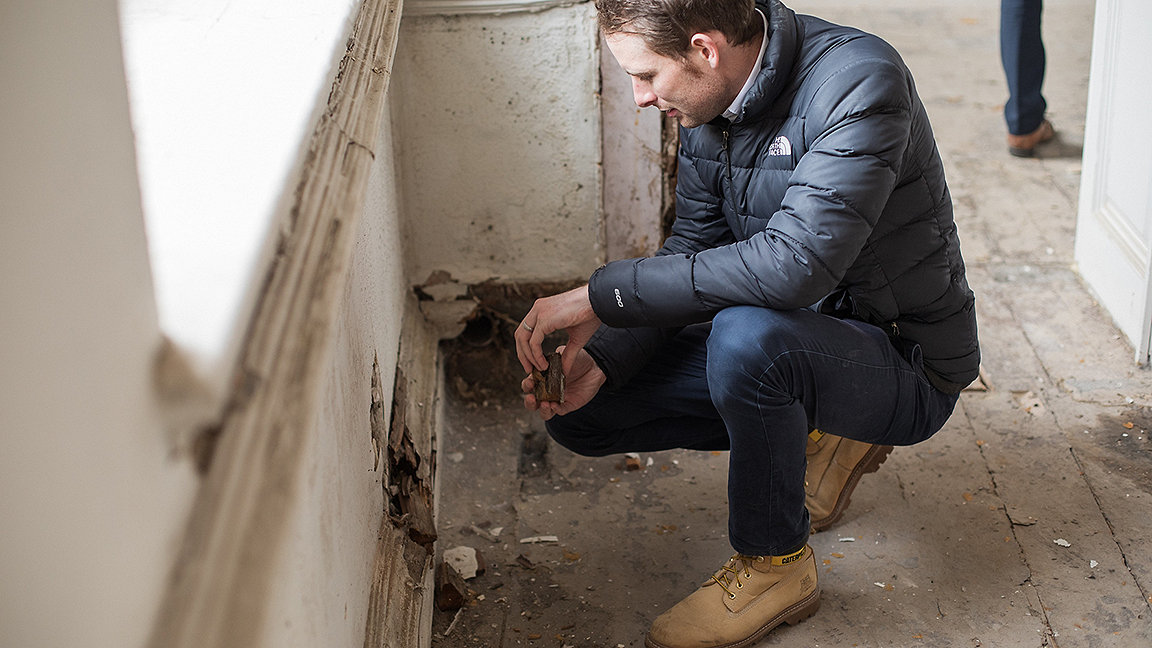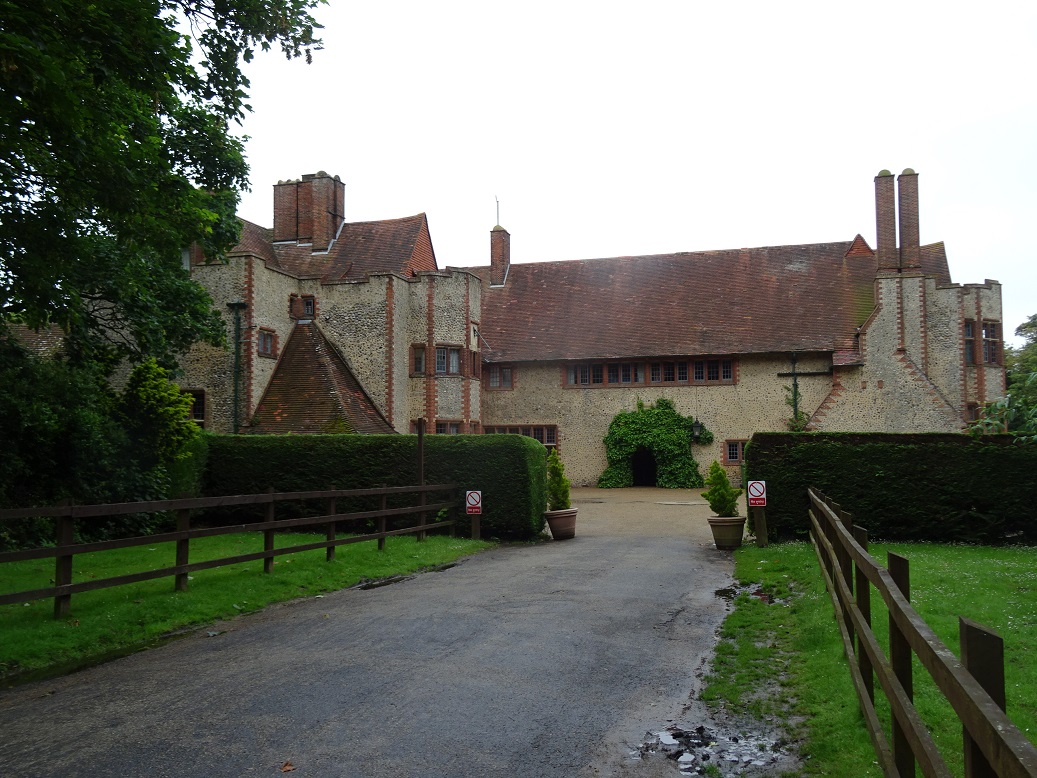
James Cullen inspecting defective building for dry rot and timber decay © James Cullen
My career in building surveying stemmed from a love of construction work, experience on the tools and an interest in grand designs and property refurbishment. I wanted a job that was different each day, and would challenge me while also being interesting.
To this day I am still learning, and continue to find building surveying work engaging. My work has involved surveying some of the finest homes in the North East of England, resolving disputes, and working on nightclubs, hotels, offices, retail and a range of listed buildings.
Why profession's resilience still resonates
Although I had become interested in working in the built environment while I was at school, it was only after the 2007 recession when I was a landscape gardener and handyman that I decided to pursue a career in surveying.
I chose the profession because I believed it would be resilient. If one area of the market were to struggle, such as residential, there would be others that would flourish, such as commercial work or public-sector developments.
As we are seeing market uncertainty again now, no doubt many aspiring professionals will be questioning their career goals. However, I have never seen the market so busy with a diverse range of instructions across sectors as now.
Becoming chartered helps win best projects
As soon as I entered the profession, my goal was to gain chartered status. I knew this accolade would help me attract the best projects.
On becoming an RICS member, I was instantly able to access more work and was considered credible by a broader spectrum of clients. This opened up doors and opportunities – so I recommend becoming chartered to any aspiring built environment professional.
Many people ask whether building surveying is a profession suited to the academically inclined, or whether those with trade skills can enter. I was primarily coming from the academic path, although I had struggled in my school years. But I dedicated a lot of time to my studies, and it paid dividends come results day.
All the same I was a very practical person, and had experience in trade skills from a young age. Having worked from around the age of 16 as a landscape gardener and handyman, I was interested in the practical side of work, and had also been exposed to renovations and projects at home. This was invaluable, and my sound understanding of construction techniques and how complex works can be has helped fast-track my career.
Building surveying offered the chance of both practical work and theoretical study, which meant I could research and apply my knowledge to help solve problems while enjoying a different type of task each day.
Most of all, I found that being a building surveyor was fun, and this more than anything else is key to enjoying work and making you career a success.
Studies complemented by practical work
In 2010, I decided to embark on a sandwich degree at Northumbria University, which is well renowned for its building surveying programme. The degree was accredited by RICS, which streamlined my route to becoming chartered.
The degree entailed a placement year – sandwiched between the second and final years – in which students gain industry experience. I was incredibly fortunate to have varied work placements, one for a national firm and another for a regional SME.
Both provided exposure to different property types on a large scale, across a range of sectors, so I learned a great deal.
I also took on a further work-based placement in my final year to diversify my experience, gain more knowledge and take more opportunities, and I think that this – combined with academic learning – helped kick-start my career progression at an early stage.
Seizing chance to set up dedicated service
After I completed university in 2014, I went straight into a graduate role at Malcolm Hollis. When I started, I focused on recording my experience regularly for my APC. By doing so, I was able to identify gaps and plugged them with private study, voluntary work and private building projects to gain experience.
I then moved to a couple of regional surveying firms which offered me a more diverse range of experience. Around this period, I renovated a house and learned more trade skills to improve my knowledge as well as my ability to understand and critique work. I gained chartered status in 2016 and then progressed to senior surveyor level at the firm I was working for at the time.
After presenting a business pitch for client work in 2018, I was headhunted by George F. White LLP. I was asked whether I would consider setting up a new building surveying service in the company.
The firm had traditionally focused on real estate and rural services and not been involved in the discipline, so I jumped at the opportunity. I joined at associate level, and after four years was made partner. I employ a number of building surveyors, including graduates of the same course I took at Northumbria.
Fun and teamwork help overcome challenges
Setting up a building surveying service brought its own challenges. Complying with RICS' standards and Rules of Conduct was key. I had to set up procedures, templates and documents that evidence our compliance while also generating a new income stream and client leads.
So, I focused on work I enjoyed. My advice to anyone is to choose work you enjoy. It keeps you engaged. I have been so fortunate to work on many high-profile developments, buildings and sites.
I have, however, always made sure that I do jobs at all levels to showcase that being a partner does not make me better than anyone else in my team. They are brilliant, and I firmly believe that working alongside them on any job is just as important as the high-profile schemes.
'I do jobs at all levels to showcase that being a partner does not make me better than anyone else in my team'
Training initiative leads to fellowship
After the Grenfell Tower fire in 2017, I took it on myself to develop CPD training for professionals to raise awareness of other fire-related risks in buildings.
I provided training for many firms, local authorities and at RICS events, and it was this – among other aspects associated with setting up a building surveying consultancy such as compliance and lead generation – that resulted in my gaining fellowship status in 2020 during the COVID-19 pandemic. In my late twenties, I became the youngest RICS fellow in the world.
In my career, I had lost work and bid opportunities because of the perception that, as a younger professional, I would be inexperienced. I felt the need to disprove this, so I was proud to have become a fellow. It demonstrates that, despite my age, I can be up there with the most well-recognised surveyors globally.
I have now acted as an independent expert witness on a significant number of cases, and have secured settlements of six figures. Better still, I love the variety in my work – and can say I continue to learn every single day. For instance, working as an expert witness has allowed me to use my academic research and understanding of regulations alongside practical site work and assessment.
Variety fuels career fulfilment
Becoming a partner at a firm was my aspiration as soon as I entered the profession. I also felt that gaining this status would allow me to secure more exciting and interesting work. Alongside fellowship, my position has simply cemented the quality of instructions I have been offered.
I have surveyed and advised on many beautiful listed buildings across the north of England, and this has also been enjoyable. I also recently surveyed an international airport, work that involved closing airspace so I could fly a drone to survey the site. It was a project that typifies why no two days in my career are the same.
My advice to aspiring young surveyors in any RICS discipline is that this is a profession for those who want a career where you can always learn, enjoy work and excel – no matter your age or background.
James Cullen is a partner and head of the building surveying service at George F. White LLP
Contact James: Email
To learn more about the benefits of RICS membership, please see the RICS website.

